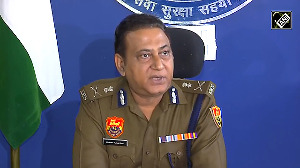The Indian electoral system needs a total revamp, says Dr Krishnasamy, the founder president of Puthiya Thamizhagam.
Puthiya Thamizhagam represents the dalit community of the southern region in Tamil Nadu.
One of his demands is that a separate electorate should be created for scheduled castes and tribes so that they can elect their representatives directly and without fear. Ambedkar first suggested this in 1931. Even after 57 years of independence, the problems and atrocities faced by dalits have not reduced. Which is why, he says, Ambedkar is valid even today.
Dr Krishnasamy adds, "Ambedkar feared that scheduled castes and scheduled tribes will not get due representation in legislatures. That is why he wanted a separate electorate for them. Gandhi opposed it vehemently saying it would divide the Hindus. When Gandhi went on fast, Ambedkar accepted the idea of reserving constituencies to safeguard his life."
Ambedkar did not believe a separate electorate for dalits would divide the society, he says. "It is a fact that Indian society is divided along caste lines. Even after 57 years of independence, nowhere in the country are inter-caste marriages a norm."
According to Dr Krishnasamy, reserving constituencies for SCs and STs has not served the purpose as dominant political parties and not the party that represents the dalits select candidates. Consequently, he says, MPs and MLAs elected from the reserved constituencies act as the representatives of the political parties.
"It's either the national party or the state-level party that decides who should contest. How can you expect such a person to work for dalits? There are seven reserved constituencies in Tamil Nadu. What I suggest is, let the dalits of Tamil Nadu vote for the general constituency and also for the reserved constituency. This is the only way dalits, who constitute 20 percent of the population in Tamil Nadu, can select their leader."
A separate electorate is the only way to empower dalits and strengthen grassroots democracy, he says.
Creamy layer
Dr Krishnasamy, a qualified medical doctor, is of the view that the 'creamy layer' criteria should be adopted for all communities that enjoy reservation. "Nowadays, you see upper caste within the lower castes. What we need is, the first generation should be given priority in reservation. What happens now is that only some people enjoy the fruits of reservation while the poorest in the villages still languish in poverty and lack of opportunities."
Proportional representation
Dr Krishnasamy feels that true representation of people is not possible if we follow the present electoral coalition politics. In 1991, the AIADMK-Congress alliance swept the entire assembly seats, but the AIADMK got 40 percent votes and the DMK 34 percent. Still, the DMK front won just two seats. "With just 40 percent votes, they won 232 seats out of 234!"
In 1996, the AIADMK front won only three seats and the DMK the rest. The difference in the votes they got was just 6 percent. In 2001, the AIADMK front got 31 percent and the DMK front 30.4 percent; the difference was just 0.6 percent, but the DMK front got around 30 seats only. "With just 0.6percent difference in votes, the AIADMK could come to power, and that too with more than 170 seats!"
In the 2004 Lok Sabha elections, Dr Krishnasamy points out that the difference between the two fronts was just 25 lakh votes. But the DMK front swept the elections.
"How can you call this democracy?" he asks.
In the proportional representation theory suggested by the Puthiya Thamizhagam leader, parties contesting the elections will get its representatives depending upon the number of votes polled. This, he says will lead to a fair representation of all parties. "I need not go and beg for a seat to Karunanidhi or Jayalalitha. I can go to the people. Money power will not come into play if we have proportional representation in the election system."
Dr Krishnasamy has sent a memorandum to Justice Kuldeep Singh, the chairman of the Delimitation Committee, and the Chief Election Commissioner. He also plans to write to all political parties, dalit organisations and NGOs seeking their opinion.






 © 2025
© 2025